
Wish you could balance jiu jitsu better with other areas of your life like work, school or your family?
If you’ve ever thought to yourself, “I could be better at jiu jitsu, but I just don’t have the time”, you’re not alone.
While jiu jitsu is addictive, sacrificing other areas of your life to hit that next level on the mat isn’t always practical.
And when you factor in other obligations like your career, your studies, or looking after your kids, finding more time for the gentle art just doesn’t seem possible.
While we can’t guarantee extra hours in your day, or give you a secret pill that will take you from white belt to black, we can help you find a little balance in your life.
After reading this article, you’ll have the knowledge and the tools you need for scheduling your ideal week for jiu jitsu and balancing your training with your work, school and your family life.
How Planning Your Ideal Week Can Help You Achieve A Better Jiu Jitsu, Work, School & Family Life Balance
As Stephen Covey stated in his book The 7 Habits of Highly Effective People…
“Most people think in terms of weeks. But most third-generation planning tools focus on daily planning. While they may help you prioritize your activities, they basically only help you organize crises and busywork. The key is not to prioritize what’s on your schedule, but to schedule your priorities. And this can best be done in the context of the week.”
Basically, seeking to plan your week ahead, allows you to see the bigger picture and plan your actions towards achieving your goals, rather than facing hour to hour tasks that seem more important than they actually are.
Creating a practice of planning your week is much like planning a budget for your finances, only with your time instead of your money.
When you’re able to see how much time you’re spending each day towards your goals, you begin to see how much time you waste not working to achieve your goals.
Creating your ideal week removes randomness and uncertainty from your days and can give you the confidence knowing that what you’re doing in each hour of every day is going to pay off somewhere down the line.
The Tools You Need To Plan Your Training Week
Planning your ideal week for jiu jitsu is so simple and cheap it’s practically free.
And you only need two tools to get started.
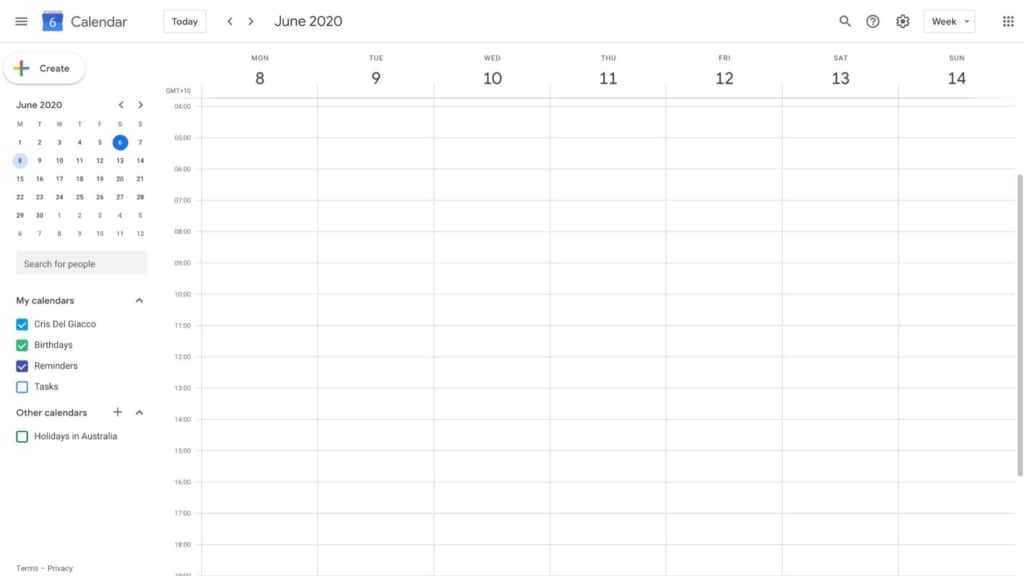
Tool #1 – Use To Plan “What You Will Do”
Google Calander, or its equivalent, is perfect for this task.
Google Calendar is such an awesome tool for planning your week because it allows you to easily create and edit upcoming tasks and set notifications for your laptop, desktop, phone, and tablet.
Which means you’ll never forget what you have on your schedule ever again.
The key strength to a program like Google Calendar, over pen and paper options, is that it can be easily edited and moved around without creating a huge indecipherable mess.
This is why you’ll be using Google Calendar to plan WHAT YOU WILL DO.
Look, we don’t live in an ideal world, and sometimes things just don’t go to plan.
The unexpected happens, people cancel on you or events fall through and while you’re planning your ideal week with the goal of reducing uncertainty and to getting sh*t done – you still need to be flexible.
This is where the Google Calendar shines, as you can easily move tasks around, delete them, add them and edit them without the mess…
…and all at the click of a button.
But that doesn’t mean the pen and paper option doesn’t have its place in scheduling your ideal week for jiu jitsu.
Which brings us to our second tool.
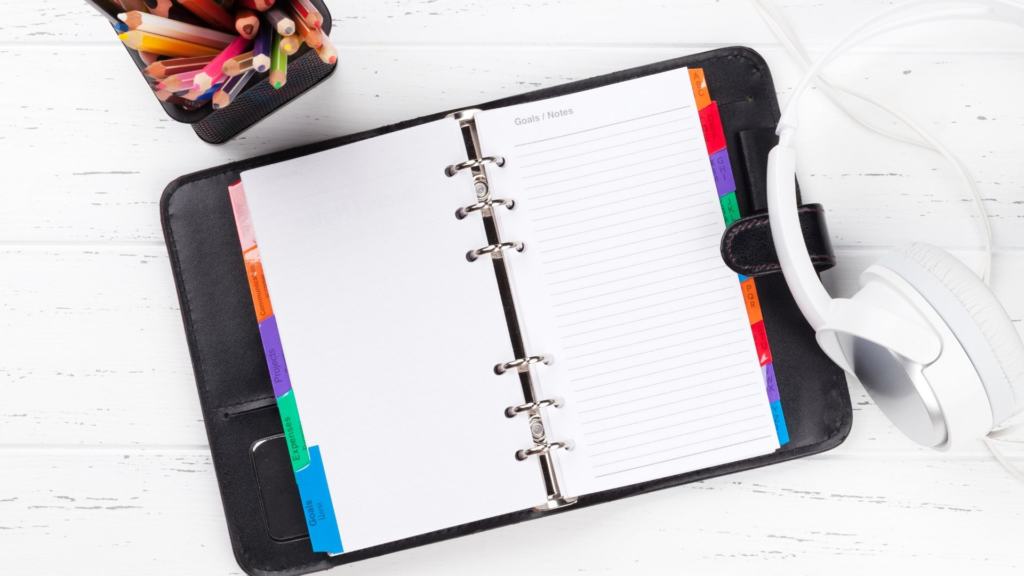
Tool #2 – Use To Record “What You Did”
Has the question “what did you do today/yesterday/last week/last century?” ever left you stumped?
Don’t worry, it happens to everyone. We get so busy sometimes we often forget what day it is, let alone what you did on January 14th 2018 at 11:00 am or the exact date and time you last gave your dog a bath.
For some, knowing what you did and when isn’t too important, however for others, it certainly can be.
For example, ever had a boss ask you what the hell it is you’ve been doing all day? Well, now you can show them.
Ever wondered what you’d say if you one of the cops from Law & Order burst into your workplace demanding to know where you were on April the 15th at 3:00 pm? Now you have an alibi.
But, you may be surprised to know that writing down your daily events has much greater benefits to provide you, including…
- A chance to boost your development by 25%
- Alleviate anxiety; and
- Helping you sleep
Those are some hefty claims, so let’s take a little time to unpack them and provide you with a few studies to back them up.
“By three methods we may learn wisdom: First, by reflection, which is noblest; Second, by imitation, which is easiest; and third, by experience, which is the bitterest.”
Confucius
According to this study, regular bouts of reflection can be a critical component in an effective learning process.
Reflection can be defined as “ an intentional attempt to synthesize, abstract, and articulate the key lessons taught by experience.”
And what is the best method for reflection?
Keeping a journal. That’s right, taking time out after each class to reflect on the lessons you learned can provide the extra kick you’ve been looking for.
In the study above, participants who reflected by writing in their journal at the end of each day benefited from a 25% increase in the performance of specific tasks compared to their counterparts who didn’t write down their reflections.
You see, these test subjects went beyond “doing”, and also “thought” about what they were doing.
So, if you’re someone who feels you don’t have a mind for jiu jitsu, or you find it difficult to conceptualize what it is you need to be doing on the mats, a regular practice of reflection can help you train to remedy those issues.
Essentially, the more reps you get reflecting after training, writing down your thoughts on what you learned and what you did, the more you’ll be training yourself in the art of mastery.
The results of that study also suggested that writing down your reflections may help alleviate anxieties by training yourself to focus on positive things in your development.
For example…
Less than ideal reflection — I sucked tonight, I just couldn’t get anything going and my cardio was garbage. Hopefully, things will turn around by next week.
More ideal positive and proactive reflection — The new guard retention concept I used tonight has promise. Todd passed my guard by doing ABC, but maybe if I try XYZ next time we roll, I can get my guard back. I rolled 5 rounds tonight. That’s one more than I usually do, which is great.
If you’re saying “ I don’t do anything positive at training” – stop that. You’re being too hard on yourself.
Thinking like this usually means you’re visualizing a standard that, at your current level, is unrealistic and out of your reach.
If you’re a blue belt who trains a couple of days a week, don’t beat yourself up when you can’t pass that brown belt’s guard…
… no one is expecting you to.
Instead, focus on the small gains you’re making.
A focus on positivity will help you identify what’s working in your game, what you need to avoid and more importantly, it will give you confidence.
This accelerated learning by reflection premise is fueled by reflection on self-efficacy, that is…
… The belief in your capabilities to organize and execute what needs to be done.
Focusing too much on your failures will only rip your confidence to shreds: making you apprehensive in your movements.
And, you know what, no one ever achieved anything by thinking they were garbage.
And finally, this study suggests that taking 5 minutes or so each night before bed to write down your to-do list for the next day may help you fall asleep faster.
The theory is, taking time to “off-load” your responsibilities and obligations each night can aid in freeing your mind from the whirlwind of your coming day.
And the more specific you are in writing down this to-do list, the faster you’ll potentially fall asleep.
As you look at your calendar, you’re going to see the tasks ahead for each day in advance.
Don’t let this stress you out.
Write it down and let tomorrow you deal with it.
Planning Your Ideal Week To Balance Jiu Jitsu, Work, Family, School & Life
Now that we have our tools and know the benefits they provide in scheduling our ideal week, let’s look at building that week out.
Designate Your Blocks
First, you need to identify your priorities and split them into three categories:
- Your Goals – these can be related to jiu jitsu, relationships, health, your career, your studies or anything you want to achieve.
- Non-Negotiables – these are ongoing obligations that are set at a fixed time and cannot be moved e.g. work, school classes, etc.
- Auxiliary Tasks – the regular essential tasks that you need to complete each week. Their place in your calendar can be moved without too much of a hassle. For example, groceries, cleaning your house, walking your dog, etc.
Make Time For You
This part is of major importance, so don’t feel like you’re slacking off by allocating some in your days for a little R&R.
While you’re on a mission to achieve your goals, you still need to have a life – otherwise, what’s the point?
Scheduling a little “me-time” will also help ensure you avoid burning out or lose motivation on the path to your goals.
Color Code Your Blocks
Ok, so now you have your list of priorities and have given yourself permission for a little R&R in your schedule, it’s time to allocate colors to each of them.
Before you do that though, next to each task in your categories above I want you to write one of the following words based on their relevance to the task:
- Jiu Jitsu
- Work
- Study
- Errands
- Me-time
Depending on your situation, you may not need to write study or work and instead may want to write something more relevant to you.
Now, allocate colors to these classifications above.
For example, here’s how I color code my own tasks in Google Calendar.

Now that you’ve identified your priorities, categorized and color-coded them based on their obligation type, it’s time to start putting your calendar together.
Place Non-Negotiable Tasks On Your Calendar
This is important, as there’s no point filling your day with jiu jitsu if know you HAVE TO BE SOMEWHERE at a certain time without exception.
Right now I want you to open you calendar and create events for your work schedule, class timetable, or anything else that you need to take part in that is out of your power to reschedule.
Important – at this initial stage, we are essentially allocated “focus blocks” to our days. For many of us, our work and school days involve different specific tasks and events and while we will be adding those later, for now, I want you to focus on adding general “focus blocks” to your calendar using the lighter versions of the colors you chose in the previous step.
Let’s take a look at an example for a typical 9-5 workweek.
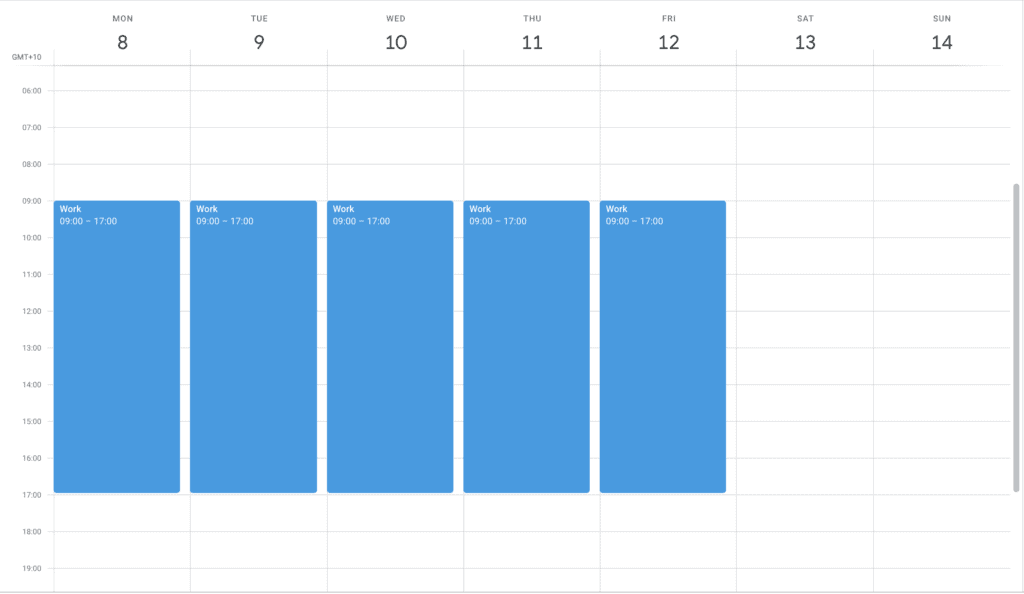
If you’re a student, your initial calendar will look very different to the example above.
But for the sake of continuity and making this guide easy to follow, we’ll stick to the typical 9-5 work week as our example.
Next, you’re going to add your “me-time”.
I suggest splitting “me-time” up into two sections: one for your morning rituals and one for your general “me-time” tasks.
Now, color your “me-time” focus blocks with the lighter shade, and use the darker shade for your morning rituals block.
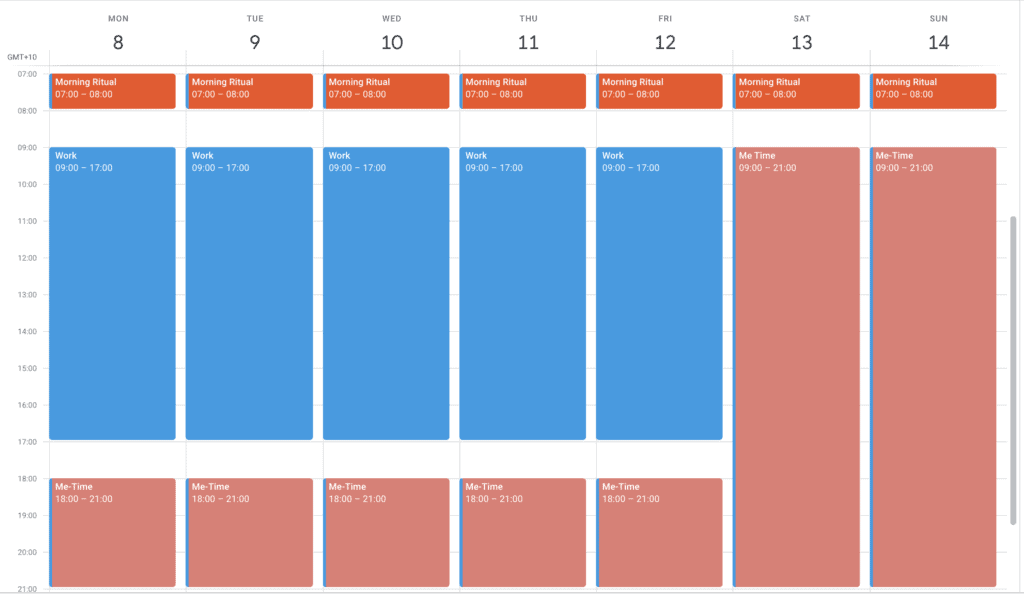
An example morning ritual could involve:
- Waking up
- Brushing your teeth
- Taking your dogs outside to go to the bathroom
- Feeding your dogs
- Meditation
- Cooking breakfast
- Ironing a shirt
While your “me-time” tasks will change from day-to-day, generally your morning ritual tasks stay the same so at this stage, we can go ahead and give them the darker shade of red.
Designate Your Days
If you run your own business or you’re studying, you may find yourself spread super thin across all of your tasks.
To remedy this, you may find that allocating your days to specific tasks/goals will help you focus and get more things done than you otherwise could randomly adding tasks to your calendar.
Let’s work with the 9-5 example again, this time imagining it from the perspective of a business owner who knows the majority of their working week is filled with tasks related to…
- Meeting with clients and staff
- Writing proposals, blogs, emails, etc
- Dealing with the marketing team and financial team
- Planning the future of the business
They then decide to allocate a day of the week to each of these categories of tasks.
This business owner also knows they don’t always get to finish each task in one day so they also decide to allocate a day to tie up loose ends.
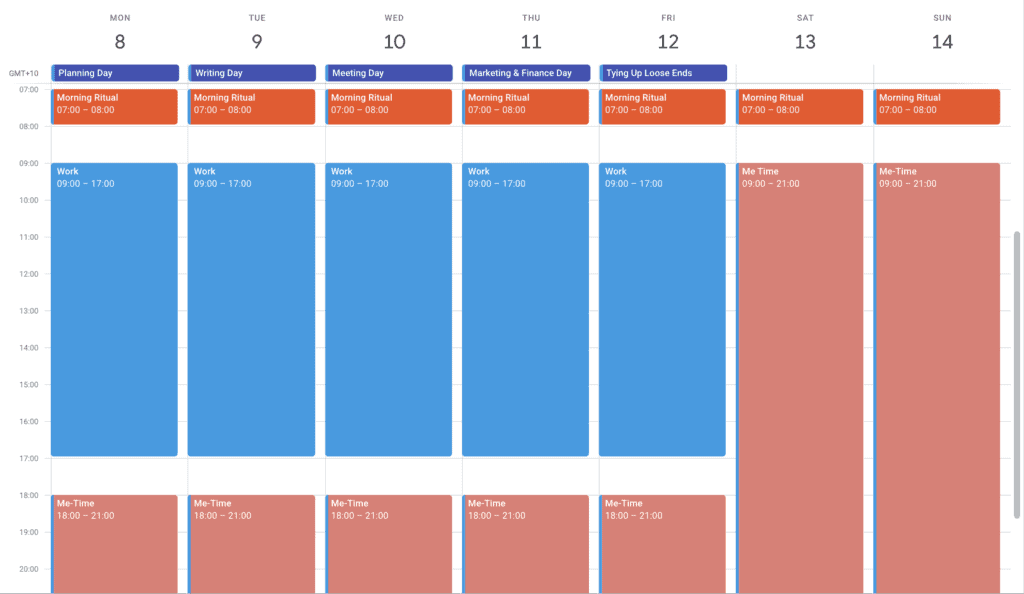
Now, this doesn’t mean the business owner refuses to work on a writing task during a meeting day. It just means that this day is predominantly focused on those types of tasks while being flexible enough to cater to others if there is time to do so.
Now if you’re a student, you may want to allocate days to specific classes, studying sessions, assignment preparation or even your part-time job.
Even though you may have to work on a study day, you can at least approach that day with a “getting my study done” mindset.
Place Your Goal Related Tasks On Your Calendar
Now it’s time to get to the specifics.
You’ve allocated your rough focus blocks, now it’s time to plan for achieving your goals.
Earlier, I asked you to write your goals as part of your list of priorities.
Now, one person’s goals will differ to the next. These can relate to jiu jitsu, careers, study, personal development, or relationships.
In our running example, let’s assume our business owner wants to…
- Get his blue belt
- Complete a course on project management
- Rekindle the spark in his relationship with his wife Sarah
- Teach his daughter to ride a bike
- Get 1,000 new subscribers on his email list for his business
After breaking down his goals into manageable chunks, our hero decides to plan his ideal week as follows…
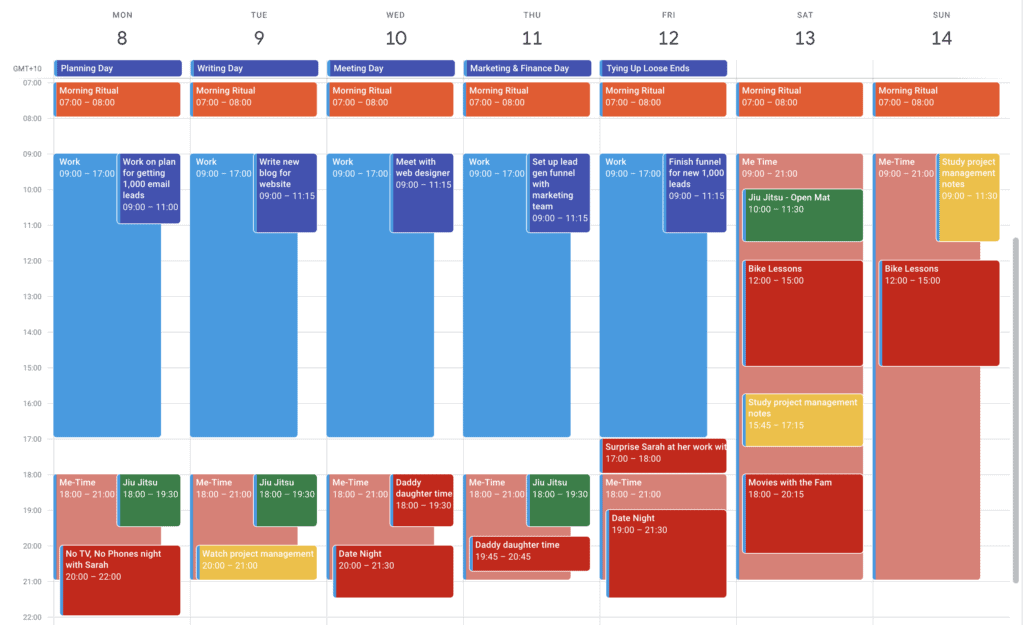
Now, to turbocharge his calendar towards achieving his goals, our hero could provide more specifics for each task.
For example, in one jiu jitsu class, he may focus on applying one technique and one technique only and designate that accordingly in his schedule.
Then, writing about his performance and how he could improve on that technique in his journal or his Jiu Jitsu Acceleration Plan.
Now that our hero has plotted the tasks for achieving his goals, he now needs to address his auxiliary work tasks and errands.
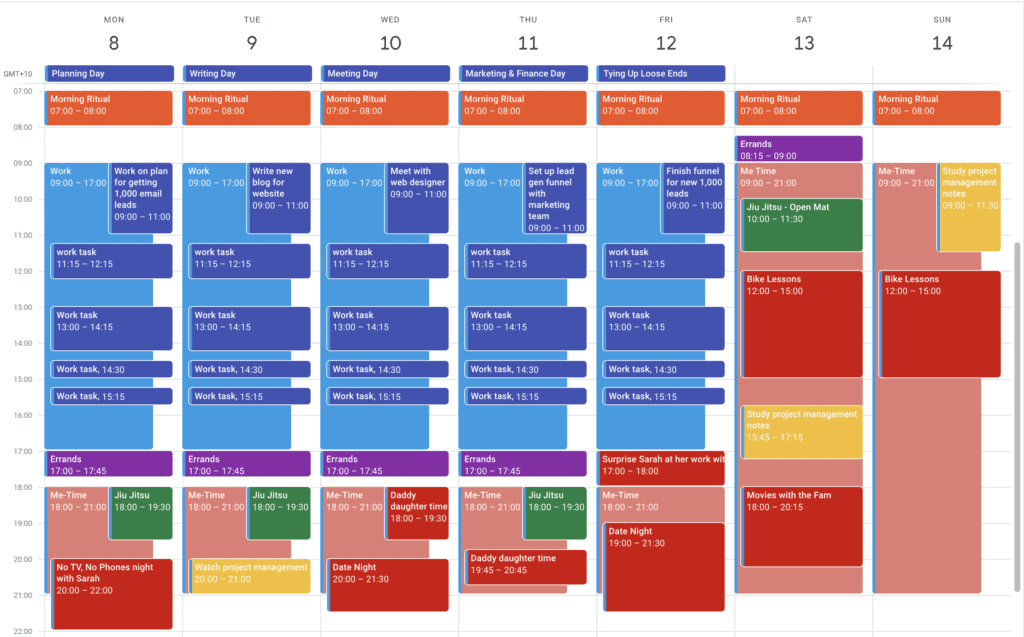
Note – I have added general tasks to our heroes day above and labeled them “work task” and “errand”, however these would normally be more specifically allocated in regards to names and times.
Next, our hero would then allocate blocks for reflection in his journal or Jiu Jitsu Acceleration Plan.
Also, he would allocate time to plan his next ideal week. Preferably this task would be performed on the Sunday as attacking this task on the Monday would severely reduce the time he had available on that day to get sh*t done.
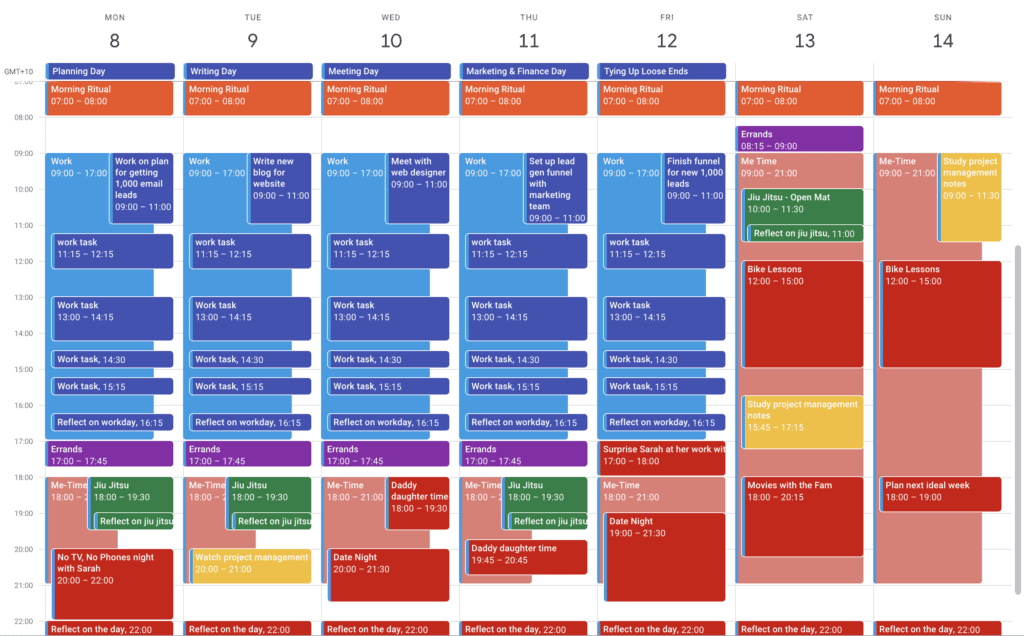
As you can see, Google Calendar is easy to use and you can drag and adjust your schedule without much fuss.
Say our hero noticed a little tightness in his back or legs and decided to work on his improving his mobility for 20 minutes a day.
All he need do is open up his calendar and add it to his schedule.
One final point I’d like to mention, when creating your own calendar, is to be realistic with your time.
Notice how in the examples above, each task is separated and many of the blocks do not touch?
This is important, as many times people will schedule their day in their calendar and forget to consider variables such as drive time, being stuck in traffic, or meetings running late or overtime, etc.
Be aware that these things can happen and where possible, factor them into your days.
Summing Up Your Ideal Week
Phew, well it took some work, but we got there in the end.
By now you will have gained the knowledge to help you plan your own ideal week for balancing jiu jitsu with your work, study and family life.
Remember, following this process and getting crystal clear with what you need to do to achieve your goals will go a long way towards removing uncertainty in your days and hopefully some of your anxieties too.
That being said, remember what I mentioned earlier…
… you have to be flexible with your planning, don’t be a slave to your calendar.
If something falls through or runs over time, it’s ok. These things happen. That’s why we plan using Google Calendar, where we can easily edit, and reflect and gather our thoughts for improvement in a journal or the Jiu Jitsu Acceleration Plan.
Speaking of which, you can download your very own Jiu Jitsu Acceleration Plan PDF right here, which, along with your Google Calendar, will serve as your guide for planning and optimizing your actions towards success on the mats.

